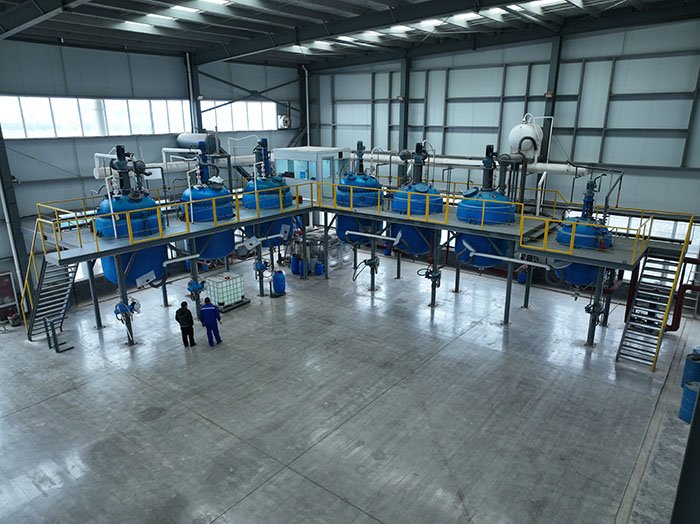The equipment required for producing asphalt emulsifiers (or emulsified asphalt) mainly includes raw material processing equipment, emulsification equipment, auxiliary equipment, testing equipment, and storage and transportation systems. The following are specific classifications and functional descriptions:
1. Raw material processing equipment
Asphalt heating tank
Function: Heat solid asphalt to a flowing state (usually 120-160 ℃) for subsequent emulsification.
Type: Electric heating, thermal oil heating, or steam heating tank.
Water treatment system
Function: Remove calcium and magnesium ions from water (softened water) to prevent emulsifier failure.
Equipment: ion exchanger, reverse osmosis device (RO).
Emulsifier dissolution tank
Function: Mix and dissolve emulsifiers (such as cationic quaternary ammonium salts, nonionic surfactants, etc.) with water to form soap solution.
2. Core emulsification equipment
Colloidal mill (high shear emulsifier)
Function: Core equipment that crushes asphalt into small particles (particle size 1-10 μ m) through high-speed shearing (speed 3000-6000rpm), evenly dispersed in soap solution.
Type: Horizontal or vertical colloid mill, commonly used by brands such as IKA in Germany and Langfang General Motors in China.
Emulsified asphalt production host
Function: Integrate colloid mill, flow control system, and temperature sensor to achieve automated production.
Example: Continuous emulsified asphalt equipment (capacity 5-20 tons/hour).
3. Auxiliary equipment
Metering system
Function: Accurately control the ratio of asphalt, soap solution, and water (such as asphalt accounting for 60%~70%).
Equipment: flow meter, quality sensor, PLC control system.
Temperature controller
Function: Maintain stable temperature of asphalt and soap solution (asphalt 120-140 ℃, soap solution 50-60 ℃).
Equipment: heat exchanger, temperature control instrument.
PH regulating device
Function: Adjust the pH value of soap solution (cationic emulsifiers require acidic environment, pH ≈ 2-4).
4. Finished product storage and transportation
Finished product storage tank
Function: Store emulsified asphalt with mixing device to prevent sedimentation (storage time ≤ 3 months).
Material: Stainless steel or carbon steel lined with anti-corrosion coating.
Transport pumps and pipelines
Function: Pump finished products to filling or transportation vehicles.
Type: Screw pump (anti shear damage emulsion structure).
5. Testing and quality control equipment
laboratory instruments
Function: Test the performance of emulsified asphalt to ensure compliance with standards such as ASTM D2397 and JTG E20-2011.
Equipment: Sieve residue tester (to check particle uniformity), storage stability tester (24-hour stratification rate ≤ 1%), viscometer (Engla or Saybolt viscometer), demulsification speed tester (to evaluate construction adaptability)
6. Environmental protection and safety equipment
Exhaust gas treatment system
Function: Process VOCs (volatile organic compounds) generated by heating asphalt.
Equipment: Activated carbon adsorption tower or catalytic combustion device.
FPD
Function: prevent the risk of asphalt flammability at high temperature, such as foam fire extinguishing system.
Key factors in equipment selection
Capacity demand: Small laboratory equipment (0.5 tons/hour) vs industrial production lines (over 10 tons/hour).
Emulsifier type: Cationic emulsifiers require acid resistant equipment (such as stainless steel material).
Automation level: PLC control system can improve the accuracy and stability of proportioning.
7. Typical production process
Asphalt heating → 2 Soap preparation → 3 Colloidal mill emulsification → 4 Finished product testing → 5 Storage/Filling
8. Precautions
Low temperature adaptability shall be additionally considered in plateau areas (such as Xizang), and equipment shall be designed for thermal insulation.
Regularly maintain the clearance between the colloid mill rotor/stator (usually 0.1-0.5mm) to prevent a decrease in emulsification effect.
If specific equipment models or supplier recommendations are needed, they can be further refined based on production scale and technical requirements.


